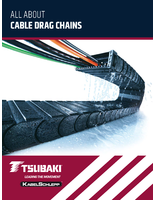EXTOL's XML Supersizes Business Integration Advantages for Maines
Share:
POTTSVILLE, Penn.--Business agility takes on a critical meaning in the fast food business, where getting the goods to the customer in a timely fashion means survival. Maines Paper and Food Service, Inc. has implemented business integration technology from EXTOL International to help maintain a reliable supply chain, for everything from fresh, frozen, dry grocery foods to paper goods, beverages and beverage equipment.
Every day, Maines, the nation's second largest independent systems foodservice distributor, struggles to provide superior customer service that will separate it from its aggressive, and numerous, competitors. Technology must not be a weak link in the supply chain that serves more than 1,000 customers in restaurants, educations, healthcare, convenience stores, cruise lines and camps. A few hours late can mean hundreds of lost sales, and paper-thin margins can quickly waste away.
To meet and exceed the service expectations of thousands of its customers' locations requires near flawless execution of Maines' business. This is just the starting point in creating the differentiation it needs to compete successfully in a hugely competitive industry. New customer demands, including rapid adoption of new business processes and high service level commitments, meant implementation of an XML messaging format, because the company's EDI infrastructure could not support all the new requirements.
"Customer loyalty is a matter of survival for fast foods providers, and walking away satisfied is the key ingredient," said Dennis J. Bonagura, president and COO of EXTOL. "That's why a fast, reliable supply chain is essential to a healthy bottom line."
As Maines' customers grow revenue through market expansion and improved operational performance, they recognize that fewer distributors are qualified to provide the wide range of services required to meet these sometimes competing goals. They include not only an efficient distribution network over a wide geographic area, but also meeting the supply chain and business integration requirements necessary to support operations on a broad scale.
As one example of a requirement for speed and agility, a multi-year contract with one of the world's largest chain restaurants depended on successfully meeting their customer's technology requirements, and on a scale it was unable to support with its current platform. A major stipulation in the service level agreement was that Maines transmit data using the customer's proprietary Extensible Markup Language (XML) format, meaning the company's EDI network would not be useful.
Despite the extensive experience the company had with EDI, the X12 standard it supported was unable to meet the data and supply chain collaboration requirements of the agreement. With barely four months to comply, the company decided to evaluate offerings of technology vendors whose products were already installed in-house.
Maines had built its extensive EDI infrastructure around Extol's EDI Integrator. Founded in 1994, Extol provides B2B application integration software to the mid-market, and Maines was one of its original clients. Its Extol Business Integrator, a platform-independent, J2EE-based, integration broker, appeared capable of meeting Maines' technical requirements. Based on their longstanding relationship, Extol's high level of credibility, and the capabilities of Business Integrator, Maines decided to begin implementation of the technology to meet its customer's XML requirement.
The Extol Business Integrator [EBI] had never been put to that kind of test, as 100,000 records, essentially a unique item catalog for each of the customer locations, were submitted for processing. Maines met its customer deadline, and consequently made an increasing commitment to the Integrator. Beyond that, implementation of the EBI represented the first step in an ongoing integration strategy that allows for one access point to all of the company's applications and systems, regardless of file and data formats requested or received.
In the many-to-many model of Wholesale Distribution, complexity rules; lack of standards discourages attempts to integrate data electronically. Without deep B2B integration, the cost of transacting business continues to grow. Maines' customers understand this dynamic, and demand integration as part of their service level agreements. Maines is miles ahead in terms of meeting integration challenges by adopting an integration platform approach, rather than have an integrator deliver a one-off solution that would not scale to meet other customer requirements.
The Maines IT group recognized that the XML technology would give it the flexibility to meet similar future requests. The company views technology as a competitive differentiator, used both to manage internal operations and as an aid to the companies it serves. Its EDI and now XML interchanges allow Maines to integrate with suppliers and customers in their chosen format, and according to their business processes.
Competitiveness is not just a function of price and service. Maines has found that differentiating through technology is a key component of servicing and satisfying large customers.
About EXTOL
EXTOL International, Inc. is a leading provider of B2B integration application software for resource-constrained companies that want to integrate demand-driven supply chains. Extol solutions are ready-to-use applications that target multiple B2B and internal challenges with a common integration platform that empowers existing IT teams to respond rapidly to new business opportunities and demands. Extol solutions are also available preconfigured to address specific electronic commerce applications including EDI, AS2, XML, data synchronization (1SYNC) and the integration and management capabilities required to take full advantage of supply chain functionality. For more information, visit www.EXTOL.com.
Contacts
EXTOL International, Inc.
Stephen Rosen, 201-847-1200
srosen@EXTOL.com




